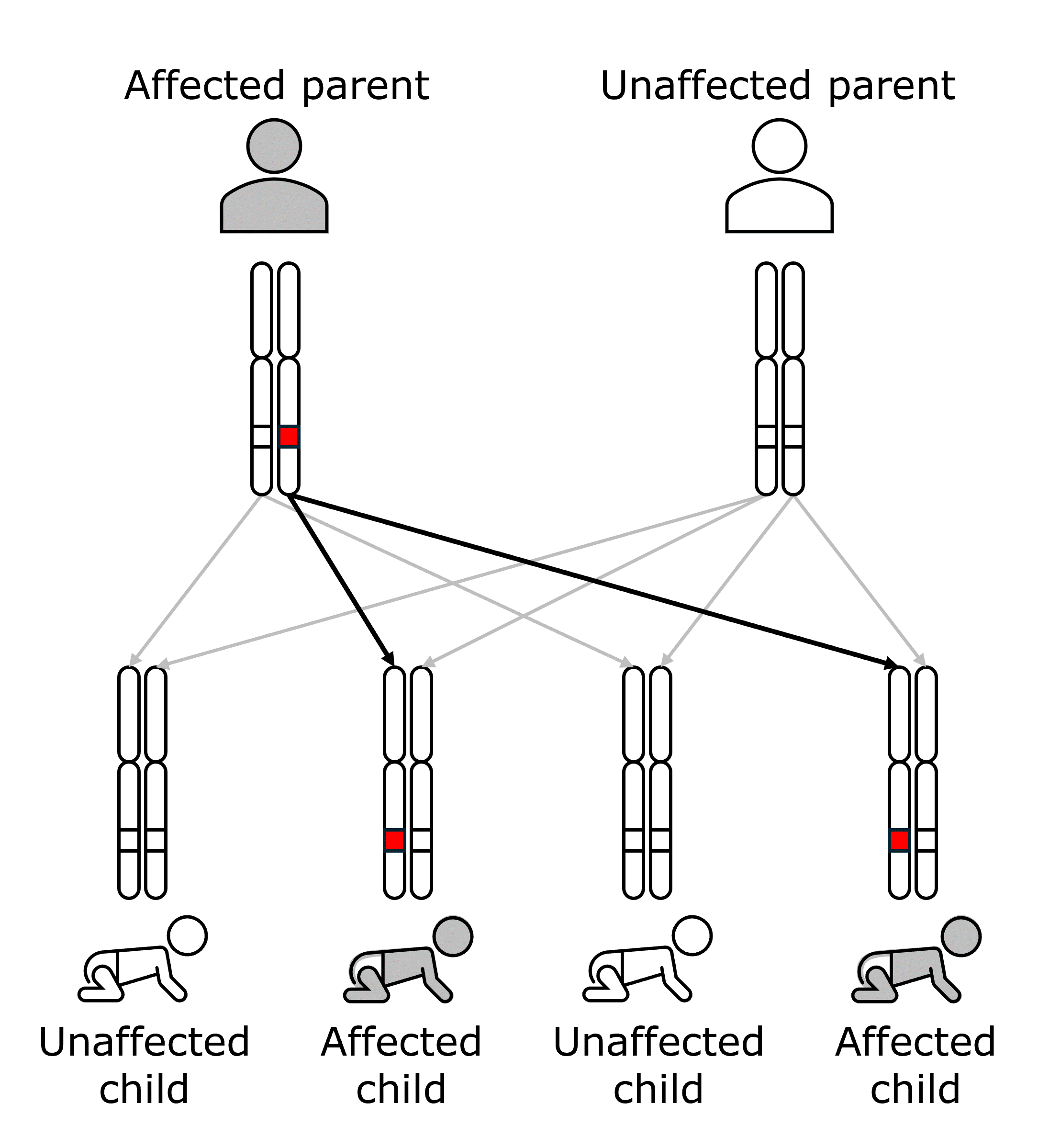Genetic Conditions
Learning about autosomal dominant inheritance
Genes are the instructions that tell your body how to develop and function. They are like a recipe for making cookies or the blueprints for a house.
You have 2 copies of almost every gene. One copy comes from the egg and one from the sperm that formed you. There are thousands of genes that are important for health.
We all have differences in our genetic instructions that make us different from each other. We call these variants. Many of these differences do not cause any health problems. These are called benign variants. But sometimes a difference in our genetic instructions can cause health problems. These differences are called pathogenic variants or disease-causing variants. Genetic conditions can happen in different ways, including if you have a pathogenic variant in an important gene.
Autosomal dominant inheritance
Autosomal dominant inheritance refers to one way that a genetic condition can happen and how it can be passed down from parent to child. The term autosomal means that the condition can affect anyone, no matter their gender or sex. The term dominant means that only 1 copy of the gene needs to have a pathogenic variant for the condition to happen. The other copy of the gene does not need to have the pathogenic variant.
Autosomal dominant conditions
There are many different autosomal dominant conditions that can affect our health and development. In some autosomal dominant conditions, all individuals with the variant will develop the condition. In other autosomal dominant conditions, individuals with the variant may or may not develop the condition.
Autosomal dominant conditions can affect people at different stages of their life. Depending on the condition, signs may be present prior to or at birth, in childhood, in adolescence, or in adulthood. Autosomal dominant conditions may impact people in the same family differently.
Genetic testing for autosomal dominant conditions may or may not be available. In general, genetic testing may be considered for people with signs and symptoms of the condition or for people with a family history due to a known pathogenic variant.
How autosomal dominant conditions are passed down from parent to child
If one parent has an autosomal dominant condition, they have 1 gene without a pathogenic variant and 1 gene with a pathogenic variant. In each pregnancy, the child gets 1 gene from each of their biological parents' pairs of genes.
This means that in each pregnancy where 1 parent has an autosomal dominant genetic condition, there is a:
- 1 in 2 chance (or 50% chance) that the child will inherit the gene with the pathogenic variant. When the child inherits this gene, they will develop the autosomal dominant condition or be at increased risk of developing the condition.
- 1 in 2 chance (or 50% chance) that the child will inherit the gene without the pathogenic variant. This means that the child will not have the autosomal dominant condition and cannot pass it on to future generations.

Parents cannot control what genes are passed on to their children. Having a genetic condition, or having a child with a genetic condition, is not caused by anything a person or parent did or did not do. The risk of inheriting an autosomal dominant condition is also not impacted by:
- the parent or child's sex
- which parent has the pathogenic variant
- anything a parent did or did not do before or during pregnancy
- the outcome of a previous pregnancy (all pregnancies between the same 2 people will have the 1 in 2 (50%) chance of the child inheriting the autosomal dominant condition)
Finding a genetic variant for the first time: De novo variants
A person with an autosomal dominant condition may or may not have a family history of the condition. In some families, the genetic variant responsible for the condition has been present in the family for generations. Other times, the genetic variant can be found in an individual for the first time. This is called a de novo (or "new") variant as it is not inherited from either parent and has occurred for the first time in that person. Once a de novo variant has occurred, that person now has a 50% chance of passing on the variant to their own child.
Genetic counselling
If you have any questions about autosomal dominant conditions or inheritance, talk with your healthcare team.
Genetic counselling is available for individuals who have a genetic condition or who may be at risk of a genetic condition. A genetic counsellor can review your family history, genetic testing options, and screening options, and they can help families and individuals adjust to their diagnosis. Ask your healthcare provider if a referral for genetic counselling may be right for you.
To see this information online and learn more, visit MyHealth.Alberta.ca/health/aftercareinformation/pages/conditions.aspx?hwid=custom.ab_genetics_autosomal_inhert_inst.

For 24/7 nurse advice and general health information call Health Link at 811.
Current as of: August 23, 2024
Author: Clinical and Metabolic Genetics Program, Alberta Health Services
This material is not a substitute for the advice of a qualified health professional. This material is intended for general information only and is provided on an "as is", "where is" basis. Although reasonable efforts were made to confirm the accuracy of the information, Alberta Health Services does not make any representation or warranty, express, implied or statutory, as to the accuracy, reliability, completeness, applicability or fitness for a particular purpose of such information. Alberta Health Services expressly disclaims all liability for the use of these materials, and for any claims, actions, demands or suits arising from such use.
